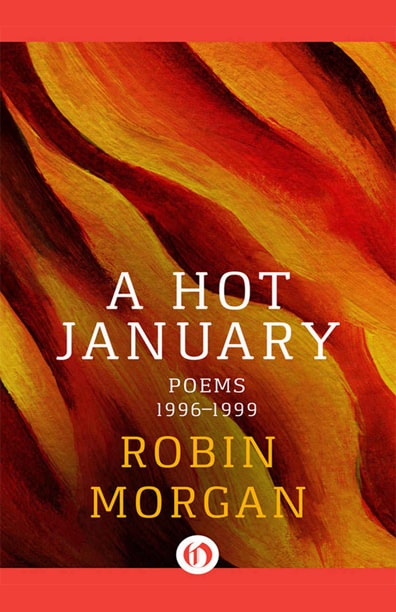A Hot January
Poems 1996–1999
Robin Morgan’s work, celebrated for its vindication of the female experience and its evocation of the zeitgeist, is here intensely personal and powerful.

W.W. Norton & Company, 1999
Open Road Integrated Media, 2016
“Morgan proves that exquisite poetry can be the most surprising gift of grief. A volume as proud, fierce, vulnerable, and brave as the poet herself.” —ALICE WALKER
“Love is impossible. If it were possible, it wouldn’t be love. This truth has never been more exemplified than in Robin Morgan’s most recent (and best) collection of poems. They hit square center. The only reason I don’t set them to music is that I’d burst into tears during the process and smear the ink.” —NED ROREM
“Sassy, sexy, and cerebral.” —THE AMERICAN ACADEMY OF POETS NEWS
“A collection of strikingly memorable poems . . . in pace, diction, idiom, Morgan slices emotion raw. Yet, strangely, these are poems you will want to read to read aloud when you feel in need of joy.” —THE WOMEN’S REVIEW OF BOOKS
“If love is hell, A Hot January takes us into the very belly of the devil’s furnace. [A] forceful collection, an intense poetics.” —THE VIRGINIA QUARTERLY REVIEW
Celebrated for her exquisitely crafted poems revealing an alternate female reality, award-winning poet and bestselling author Robin Morgan gives us, in this fifth collection, her most intimate work yet.
The poems gathered here trace a stunning spectrum of love, betrayal, loss, pain, rage, and survival. Skirting madness in the wake of a tempestuous relationship’s end, these poems slice language with knife-edge bitterness, but within the deliberate constraints of form. Individual poems have become famous: “Add-Water Instant Blues” is the most anthologized; “Cave Dwellers” and “Acrobats and Clowns” have been widely translated; and the various “disguised,” subtle sonnet forms throughout the book have been used to teach the art of writing poetry. Art itself becomes the healing theme, and a number of the poems here are in dialogue with other poets, including Marianne Moore, Audre Lorde, Adrienne Rich, Muriel Rukeyser, Christopher Marlowe, John Donne, William Blake, and Robert Graves. The wise voice that emerges dares celebrate a quiet joy, tempered only by fire.


